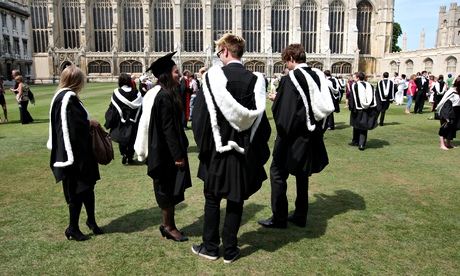Both Australia and the UK have seen an expansion in the numbers of students entering higher education. Australia has removed the cap on student numbers altogether, while the cap in England (though not in Wales, Scotland and Northern Ireland) will be removed in 2015.
What impact has this had on access? There are now more students than ever before entering higher education, but is the student body more representative than it was when higher education was just for a few? Are we seeing an increase in the proportion of students from less well-off backgrounds entering the elite institutions, or are those still the preserve of the wealthy and privileged?
In the UK, Alan Milburn's 2013 report, The fair access challenge, found that people living in the most advantaged areas are still three times as likely to participate in higher education as those in the most disadvantaged areas. The odds of a child at a state secondary school who is eligible for free school meals in Year 11 being admitted to Oxbridge by the age of 19 is almost 2,000 to one. By contrast, the odds of a privately-educated child being admitted to Oxbridge are 20 to one.
In Australia, the pattern is similar. A 2013 report, Widening participation in Australian higher education, found that while 25% of the population comes from the lowest socioeconomic group, only 17% of students come from this group, and this proportion has barely changed in five years.
Both the UK and Australian governments say they want to widen access. The Office for Fair Access in England was set up to monitor universities' access agreements, and its director Les Ebdon argues that universities need to work harder to improve access for disadvantaged groups. In May, the Australian government announced new access measures – but how effective will they be?
This Thursday (17 July), an online panel of experts from the UK and Australia will discuss:
• Widening access – what should the focus be?
• Impact on removal of caps on student numbers (UK and Aus) and tuition fees (just Aus)
• Employment prospects for students from poorer backgrounds – does uni make a difference?
• Impact of divide between the top universities and the rest
• Challenge of making comparisons between the two countries
The debate is open to all and will take place in the comments section below this article on 17 July from 9-11am BST or starting between 5-6pm for readers in Australia. Create a Guardian comment account to join in.
Panel
• Graeme Atherton, head of AccessHE, a London-based organisation that helps get under-represented groups into higher education
• Claire Callender, professor of higher education studies, Institute of Education
• Richard James, professor of higher education and director of the centre for the study of higher education, University of Melbourne
• Lucy Collins, head of widening participation and undergraduate recruitment, Bristol University
• Carl Rallings, deputy vice-chancellor for students and communities, University of South Queensland
• Penelope Griffin, head of widening participation, Nottingham University
• Dr Tim Pitman, senior research fellow, national centre for student equity in higher education at John Curtin institute of public policy, Curtin University. @timothypitman
• Elisabeth Weedon, deputy director of the centre for research in education inclusion and diversity, University of Edinburgh
• Tamsin Hinton-Smith, senior lecturer in higher education, University of Sussex
• Andy Westwood, chief executive, GuildHE. @guildheceo
• Mahsood Shah, associate professor, responsible for strengthening the research capacity on areas including access, participation, and academic outcomes, University on Newcastle, Australia
• Trevor Gale, professor and chair in education policy and social justice in the school of education, Deakin University
Join the higher education network for more comment, analysis and job opportunities, direct to your inbox. Follow us on Twitter @gdnhighered.

















